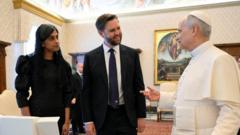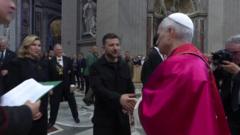During his first address, Pope Leo XIV outlined a vision for a "synodal church," where diverse voices—including laypeople—are valued in decision-making. Experiences from discussions he led as a cardinal underscore this commitment to inclusivity.
Pope Leo XIV Embraces a Collaborative Church in First Address

Pope Leo XIV Embraces a Collaborative Church in First Address
In his inaugural speech, Pope Leo XIV emphasizes inclusivity and dialogue within the Catholic Church, building on Pope Francis's legacy.
In the fall of 2024, the newly appointed Pope Leo XIV, then a cardinal, convened a diverse group within the Vatican to address pressing issues facing the Catholic Church. Among the participants were archbishops from various continents, laypeople including a Catholic podcaster and a business consultant, and representatives from different cultural backgrounds. Significantly, three women were present at this roundtable, highlighting a more inclusive approach to discussions within the church.
Each participant was given three uninterrupted minutes to voice their thoughts, emphasizing a process where "every voice had equal value," as shared by Susan Pascoe, chair of Catholic Emergency Relief Australia. Their meetings were rigorous, often lasting up to 11 hours a day over a stretch of four weeks, indicating the seriousness with which these discussions were undertaken. Notably, Pope Francis occasionally visited to listen in on these dialogues, earning himself the affectionate title of “bestie in Christ” from attendee Wyatt Olivas, a college student from Wyoming.
When Pope Leo XIV stepped onto the balcony of St. Peter’s Basilica for the first time as pontiff, he reinforced his commitment to this inclusive approach by calling for a “synodal church.” This concept is rooted in the collaborative dialogue established by his predecessor, Pope Francis, and signifies a continuation of the church's efforts to engage both leaders and lay members in meaningful conversations about faith and its challenges.
The pontiff's advocacy for a greater role of laypeople in church discussions represents a significant shift towards valuing the insights of all Catholics, suggesting that the Catholic Church may be moving towards a more democratic and transparent governance structure.
Each participant was given three uninterrupted minutes to voice their thoughts, emphasizing a process where "every voice had equal value," as shared by Susan Pascoe, chair of Catholic Emergency Relief Australia. Their meetings were rigorous, often lasting up to 11 hours a day over a stretch of four weeks, indicating the seriousness with which these discussions were undertaken. Notably, Pope Francis occasionally visited to listen in on these dialogues, earning himself the affectionate title of “bestie in Christ” from attendee Wyatt Olivas, a college student from Wyoming.
When Pope Leo XIV stepped onto the balcony of St. Peter’s Basilica for the first time as pontiff, he reinforced his commitment to this inclusive approach by calling for a “synodal church.” This concept is rooted in the collaborative dialogue established by his predecessor, Pope Francis, and signifies a continuation of the church's efforts to engage both leaders and lay members in meaningful conversations about faith and its challenges.
The pontiff's advocacy for a greater role of laypeople in church discussions represents a significant shift towards valuing the insights of all Catholics, suggesting that the Catholic Church may be moving towards a more democratic and transparent governance structure.



















